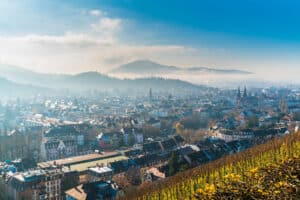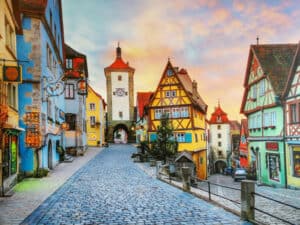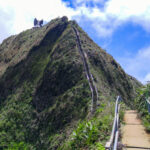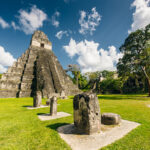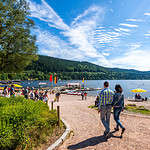Jeju Island, often dubbed the “Hawaii of Korea,” is a tropical paradise nestled off the southern coast of South Korea. With its stunning volcanic landscapes, pristine beaches, and vibrant culture, Jeju offers a unique and unforgettable experience for travelers of all ages. In this blog post, we’ll explore the top 10 things to do, how to get around, local customs, and the best culinary delights to savor on this enchanting island.
Contents
Top 10 Things to Do
- Hike Mount Hallasan: As the highest peak in South Korea, Mount Hallasan is a must-visit for nature lovers. The hike to the summit offers breathtaking views of the island and surrounding seas.
- Explore Seongsan Ilchulbong (Sunrise Peak): This UNESCO World Heritage Site is a volcanic cone that rises dramatically from the sea. Enjoy panoramic views of the coastline and witness a stunning sunrise.
- Relax at Jungmun Beach: Escape the hustle and bustle and unwind on the pristine sands of Jungmun Beach. Enjoy swimming, sunbathing, or simply strolling along the shore.
- Visit Manjanggul Lava Tube: Discover the fascinating world beneath the surface at Manjanggul Lava Tube. This UNESCO World Heritage Site is one of the longest lava tubes in the world, offering a unique underground adventure.
- Explore the Olle Trail: Embark on a scenic hike along the Olle Trail, a network of walking paths that wind through the island’s countryside. Enjoy breathtaking views, encounter local flora and fauna, and experience the tranquility of Jeju’s natural beauty.
- Visit the Jeju Folk Village: Step back in time and learn about Jeju’s traditional culture at the Jeju Folk Village. Explore traditional houses, see demonstrations of local crafts, and experience the island’s heritage firsthand.
- Visit the Teddy Bear Museum: Indulge your inner child at the Teddy Bear Museum, a whimsical collection of teddy bears from around the world. Enjoy the creative displays and take home a souvenir.
- Explore the Love Land Theme Park: If you’re feeling a little adventurous, visit Love Land Theme Park, an outdoor museum dedicated to the theme of love. Explore the erotic sculptures and learn about different cultures’ perspectives on love and sexuality.
- Take a Cruise to Udo Island: Enjoy a day trip to Udo Island, a small island off the coast of Jeju. Explore the island’s beautiful beaches, hike to the top of Seonbinyak Rock, and savor fresh seafood at local restaurants.
- Experience the Jeju Horse Culture: Jeju Island is known for its horse breeding and riding culture. Take a horse riding tour through the beautiful countryside and experience the island’s unique equestrian heritage.
Getting Around Jeju Island
Jeju Island is well-connected with a variety of transportation options. The most convenient way to get around is by renting a car, which allows you to explore the island at your own pace. Public buses also provide good coverage, especially for popular tourist destinations. For a more scenic option, consider taking a taxi or hiring a private driver.
Local Culture and Customs
Jeju Island, often referred to as the “Hawaii of Korea,” boasts a unique culture that sets it apart from the mainland. This island paradise has a strong matrilineal tradition, where women often play a dominant role in family and social affairs. This cultural aspect can be traced back to the island’s history, when men were frequently away at sea for extended periods, leaving women to manage household affairs and agricultural activities.
Matrilineal Heritage
The matrilineal system in Jeju is rooted in the concept of “halmang,” which translates to “grandmother” or “matriarch.” Halmang are revered as the family’s elders and are responsible for making important decisions, such as marriage arrangements and property inheritance. This matrilineal tradition has had a significant impact on Jeju’s social structure and cultural norms.
Shamanism and Folklore
Shamanism, the belief in a spiritual connection between humans and the natural world, is deeply ingrained in Jeju’s culture. Shamanistic rituals and practices continue to play a vital role in the lives of many islanders, particularly in times of hardship or celebration. Jeju’s folklore is rich with tales of mythical creatures, spirits, and ancient legends, reflecting the island’s unique cultural heritage.
Language and Dialect
While Standard Korean is spoken throughout South Korea, Jeju Island has its own distinct dialect, known as “Jeju-do 방언” (Jeju-do dialect). This dialect features unique vocabulary, pronunciation, and grammatical structures, reflecting the island’s isolation and historical development.
Traditional Crafts and Arts
Jeju Island is renowned for its traditional crafts and arts, which have been passed down through generations. Some of the most popular crafts include pottery, weaving, and the creation of traditional dolls. These crafts often incorporate local materials and designs, reflecting the island’s natural beauty and cultural heritage.
Festivals and Celebrations
Jeju Island hosts a variety of festivals and celebrations throughout the year, offering visitors a glimpse into the island’s cultural traditions. Some of the most popular festivals include the Jeju Folk Village Festival, the Seongsan Sunrise Festival, and the Jeju International Marine Festival. These events feature traditional performances, food, and activities, providing a vibrant and immersive cultural experience.
Best Things to Eat
Jeju Island, a culinary paradise, offers a diverse range of dishes that showcase the island’s fresh ingredients and unique flavors. From hearty seafood delicacies to savory local specialties, there’s something to satisfy every palate.
Seafood Delights
As an island surrounded by the sea, Jeju boasts a bounty of fresh seafood. Some of the must-try seafood dishes include:
- Haenmul (Seafood Soup): A flavorful and hearty soup filled with a variety of fresh seafood, including octopus, abalone, and clams.
- Jeju Abalone: Renowned for its tender texture and delicate flavor, Jeju abalone is a prized delicacy often served raw or cooked in various dishes.
- Grilled Octopus: A popular street food, grilled octopus is seasoned with a simple marinade and grilled to perfection.
- Seaweed Salad: A refreshing and nutritious side dish made with various types of seaweed, often served with a sesame oil dressing.
Local Specialties
Beyond seafood, Jeju offers a variety of other local specialties that are worth trying:
- Gochijeon (Chili Peppers Fried in Batter): A delicious and spicy snack made with chili peppers coated in a light batter and deep-fried.
- Jeju Black Pork: Known for its rich flavor and tender texture, Jeju Black Pork is a popular ingredient in barbecue and other dishes.
- Jeju Black Bean Noodles: A flavorful noodle dish made with black bean sauce, often served with vegetables and meat.
- Omija Punch: A refreshing and tangy drink made with omija berries, a native fruit to Jeju Island.
Street Food and Snacks
Jeju Island offers a vibrant street food scene, with a variety of delicious snacks and treats available. Some of the most popular street food options include:
- Bungeoppang (Fish-shaped Bread): A sweet and savory snack filled with red bean paste or cream.
- Tteokbokki (Spicy Rice Cakes): A popular Korean street food made with stir-fried rice cakes, fish cakes, and a spicy sauce.
- Kimbap (Korean Seaweed Rolls): A versatile and convenient snack filled with rice, vegetables, and various fillings.
Local Markets and Food Halls
To experience the vibrant food scene of Jeju Island, visit local markets and food halls. These bustling establishments offer a wide variety of fresh produce, seafood, and prepared foods. Some of the most popular markets include Dongmun Market and Seogwipo Olle Market.
Dining Etiquette
When dining in Jeju, it’s important to follow proper etiquette. Chopsticks are the primary utensils used, and it’s considered polite to wait for everyone at the table to be served before starting to eat. It’s also customary to say “jal mogoseubnida” (I will eat well) before starting a meal.
Conclusion
Jeju Island is a tropical paradise that offers a unique and unforgettable experience. With its stunning natural beauty, rich culture, and delicious cuisine, there’s something for everyone to enjoy. Whether you’re seeking adventure, relaxation, or cultural immersion, Jeju Island is sure to leave a lasting impression.



